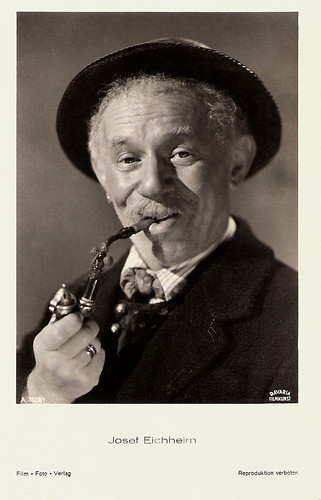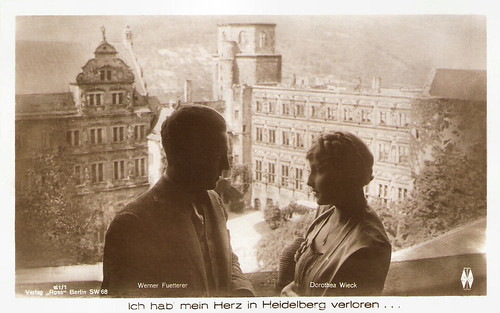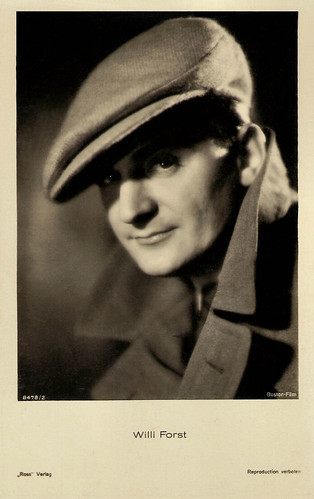German stage and film actor Josef Eichheim (1888-1945) was a popular Bavarian comedian and singer in several rural film comedies of the 1930s.

German postcard by Film-Foto-Verlag, no. A 3528/1, 1941-1944. Photo: Bavaria Filmkunst.
Josef Theodore Louis Eichheim was born in München (Munich), Germany, in 1888. He was the son of commercial agent Ferdinand Maria Josef Eichheim and his wife Maria Josefa born Weikl. In 1905 Josef moved to Switzerland where he studied acting in Zurich.
He made his stage debut at the Stadttheater Passau. In subsequent years he established himself as a popular comedian. He played in Memmingen, Biberach an der Riss, Lindau and Altenburg. During World War I, he served as a soldier. From 1919 to 1932 he was engaged at the Münchner Kammerspielen and became a crowd favourite.
His first film was the silent film Fürst Seppl/Prince Seppl (Carl Froelich, 1915), followed by a small part in the short slapstick Mysterien eines Friseursalons/Mysteries of a hairdressing salon (Bertolt Brecht, Erich Engel, 1923) with the comic duo Karl Valentin and Liesel Karlstadt. It describes the absurd goings-on of a by-no-means ordinary hair salon, where men with great beards wait in vain for a shave, while the journeyman barber takes a nap.
In 1926, Eichheim’s film career really began with Ich hab' mein Herz in Heidelberg verloren/I've Lost My Heart in Heidelberg (Arthur Bergen, 1926) starring Dorothea Wieck and Werner Fuetterer.
During the late 1920s, Eichheim appeared in more silent films such as Der Weiberkrieg/The Wives of Var (Frans Seitz, 1928), Hinter Klostermauern/Behind Convent Walls (Frans Seitz, 1928) and Bruder Bernhard/Brother Bernard (Frans Seitz, 1929). At the time, his main focus was still the theatre, but this changed in the early sound film era.

German postcard by Ross Verlag, Berlin, no. 61/1, 1926. Photo: Münchner Lichtspielkunst AG (Emelka). Werner Fuetterer and Dorothea Wieck in Ich hab mein Herz in Heidelberg verloren/I Lost My Heart in Heidelberg (Arthur Bergen, 1926).

Willi Forst. German postcard by Ross Verlag, no. 8478/2, 1933-1934. Photo: Boston-Film.
Josef Eichheim was a very articulate comedian and the new sound film suited him perfectly. He decided to focus almost exclusively on the cinema. At first, he also played non-comic roles in such films as Peter Voss, der Millionendieb/Peter Voss Who Stole Millions (Ewald André Dupont, 1932) starring Willi Forst, and the Sci-Fi film Der Tunnel/The Tunnel (Kurt Bernhardt aka Curtis Bernhardt, 1933).
Then he specialised in ‘Volksschwänke’, rural comedies which he enriched with his Bavarian humour. With Joe Stöckel, Weiß Ferdl and Karl Valentin, Eichheim represented the typical Bavarian in many films of this period. He represented the cunning peasant-rascal and had always the last laugh, as in Der lachende Dritte/The Chuckling Third (Georg Zoch, 1936) with Lucie Englisch. Other popular films were Serenade (Willi Forst, 1937), and Frau Sixta/Mrs Sixta (Gustav Ucicky, 1938). In 1939, Eichheim founded the film production company Isar, but the outbreak of World War II made this enterprise a fiasco.
In the 1940s, Eichman continued to appear in comedies, but often in smaller roles, supporting such well-known actors as Hans Moser and Joe Stöckel. Among his films were the operetta Rosen in Tirol/The Bird Seller (Géza von Bolváry, 1940) starring Marte Harell, Kohlhiesels Töchter/Kolhiesel’s Daughters (Kurt Hoffmann, 1943), and the comedy Die falsche Braut/The False Bride (Joe Stöckel, 1945) opposite Elfriede Datzig.
When Nazi Minister of Propaganda Joseph Goebbels demanded him to play the role of Jud Süss in the film of the same name in 1940, he declined. After the war, Josef Eichheim was arrested by the American military police, according to Thomas Staedeli at Cyranos without any explanation.
Imprisoned in the Internierungslager (internment camp) Emmering (near Fürstenfeldbruck), Eichheim fell ill and was moved to a hospital in Gars am Inn (some sources say Haar, near Munich). There he died in 1945, still unaware of why he had been arrested. Josef Eichheim was 57 and had appeared in 67 films.

German collectors card in the Farb-Filmbilder series by Haus Bergmann, no. 185. Photo: Ondra-Lamac-Film. Collection: Manuel Palomino Arjona (Flickr).

German collectors card in Die bunte Welt des Films series by Haus Bergmann, no. 84. Photo: Ondra-Lamac-Film. Anny Ondra and Joseph Eichheim in Kleine Dora/Little Dorrit (Karl Lamac, 1934). Collection: Manuel Palomino Arjona (Flickr).
Sources: Rudi Polt (IMDb), Thomas Staedeli (Cyranos), Filmportal.de, Wikipedia (German) and IMDb.
This post was last updated on 10 February 2024.

German postcard by Film-Foto-Verlag, no. A 3528/1, 1941-1944. Photo: Bavaria Filmkunst.
A by no means ordinary hair salon
Josef Theodore Louis Eichheim was born in München (Munich), Germany, in 1888. He was the son of commercial agent Ferdinand Maria Josef Eichheim and his wife Maria Josefa born Weikl. In 1905 Josef moved to Switzerland where he studied acting in Zurich.
He made his stage debut at the Stadttheater Passau. In subsequent years he established himself as a popular comedian. He played in Memmingen, Biberach an der Riss, Lindau and Altenburg. During World War I, he served as a soldier. From 1919 to 1932 he was engaged at the Münchner Kammerspielen and became a crowd favourite.
His first film was the silent film Fürst Seppl/Prince Seppl (Carl Froelich, 1915), followed by a small part in the short slapstick Mysterien eines Friseursalons/Mysteries of a hairdressing salon (Bertolt Brecht, Erich Engel, 1923) with the comic duo Karl Valentin and Liesel Karlstadt. It describes the absurd goings-on of a by-no-means ordinary hair salon, where men with great beards wait in vain for a shave, while the journeyman barber takes a nap.
In 1926, Eichheim’s film career really began with Ich hab' mein Herz in Heidelberg verloren/I've Lost My Heart in Heidelberg (Arthur Bergen, 1926) starring Dorothea Wieck and Werner Fuetterer.
During the late 1920s, Eichheim appeared in more silent films such as Der Weiberkrieg/The Wives of Var (Frans Seitz, 1928), Hinter Klostermauern/Behind Convent Walls (Frans Seitz, 1928) and Bruder Bernhard/Brother Bernard (Frans Seitz, 1929). At the time, his main focus was still the theatre, but this changed in the early sound film era.

German postcard by Ross Verlag, Berlin, no. 61/1, 1926. Photo: Münchner Lichtspielkunst AG (Emelka). Werner Fuetterer and Dorothea Wieck in Ich hab mein Herz in Heidelberg verloren/I Lost My Heart in Heidelberg (Arthur Bergen, 1926).

Willi Forst. German postcard by Ross Verlag, no. 8478/2, 1933-1934. Photo: Boston-Film.
A very articulate comedian
Josef Eichheim was a very articulate comedian and the new sound film suited him perfectly. He decided to focus almost exclusively on the cinema. At first, he also played non-comic roles in such films as Peter Voss, der Millionendieb/Peter Voss Who Stole Millions (Ewald André Dupont, 1932) starring Willi Forst, and the Sci-Fi film Der Tunnel/The Tunnel (Kurt Bernhardt aka Curtis Bernhardt, 1933).
Then he specialised in ‘Volksschwänke’, rural comedies which he enriched with his Bavarian humour. With Joe Stöckel, Weiß Ferdl and Karl Valentin, Eichheim represented the typical Bavarian in many films of this period. He represented the cunning peasant-rascal and had always the last laugh, as in Der lachende Dritte/The Chuckling Third (Georg Zoch, 1936) with Lucie Englisch. Other popular films were Serenade (Willi Forst, 1937), and Frau Sixta/Mrs Sixta (Gustav Ucicky, 1938). In 1939, Eichheim founded the film production company Isar, but the outbreak of World War II made this enterprise a fiasco.
In the 1940s, Eichman continued to appear in comedies, but often in smaller roles, supporting such well-known actors as Hans Moser and Joe Stöckel. Among his films were the operetta Rosen in Tirol/The Bird Seller (Géza von Bolváry, 1940) starring Marte Harell, Kohlhiesels Töchter/Kolhiesel’s Daughters (Kurt Hoffmann, 1943), and the comedy Die falsche Braut/The False Bride (Joe Stöckel, 1945) opposite Elfriede Datzig.
When Nazi Minister of Propaganda Joseph Goebbels demanded him to play the role of Jud Süss in the film of the same name in 1940, he declined. After the war, Josef Eichheim was arrested by the American military police, according to Thomas Staedeli at Cyranos without any explanation.
Imprisoned in the Internierungslager (internment camp) Emmering (near Fürstenfeldbruck), Eichheim fell ill and was moved to a hospital in Gars am Inn (some sources say Haar, near Munich). There he died in 1945, still unaware of why he had been arrested. Josef Eichheim was 57 and had appeared in 67 films.

German collectors card in the Farb-Filmbilder series by Haus Bergmann, no. 185. Photo: Ondra-Lamac-Film. Collection: Manuel Palomino Arjona (Flickr).

German collectors card in Die bunte Welt des Films series by Haus Bergmann, no. 84. Photo: Ondra-Lamac-Film. Anny Ondra and Joseph Eichheim in Kleine Dora/Little Dorrit (Karl Lamac, 1934). Collection: Manuel Palomino Arjona (Flickr).
Sources: Rudi Polt (IMDb), Thomas Staedeli (Cyranos), Filmportal.de, Wikipedia (German) and IMDb.
This post was last updated on 10 February 2024.
No comments:
Post a Comment